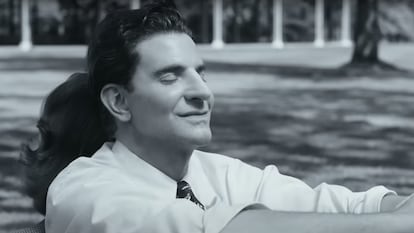The problem with the ‘slutty bisexual man,’ the label that has jumped from social networks to the world
The new stigma towards bisexuals has come from social media. He’s an imaginary character who deceives gay men with the possibility of a romantic relationship, when he is really only thinking about marrying his lifelong girlfriend

Martín Urrutia is 18 years old. He is the youngest contestant in the current edition of Operación Triunfo (Spain’s American Idol). At the beginning of the program he defined himself as someone who is “affectionate, funny, and very empathetic.” What he didn’t know then, because they hadn’t told him yet, is that he is also a “slutty bisexual.”
The meme started on X. Although the occurrence may have already existed, it did not become popular until this twelfth edition of the Spanish reality show. The singer Suu, wanting to identify LGBTQ+ members among the contestants, asked in one of the first programs who considered themselves part “of the community.” Without naming a specific orientation, Urrutia raised his hand. It was four seconds of television, enough for some fans to develop the whole narrative of the “slutty bisexual”: a young hypersexual white man with a bohemian look who has a modern mustache and hoop earrings. The figure is attractive enough to trust, who leads other men on until, inexorably, he opts for comfortable heterosexuality, ending up with him kissing a woman.
Expanding the labels used to define other people’s sexuality is always a complicated task. So once a person manages to do it, they should to make the most out of it. “The slutty bisexual did his thing again,” says a user on X, following a video in which Urrutia appears dancing with a partner. “A slutty bisexual plays with the heart of a sensitive twink [young, slim gay man, with little or no facial hair],” comments another, referring to a moment in which the singer caresses another male contestant’s hand. Others provide a more analytical perspective: “There are few things worse than a slutty bisexual who uses his ‘passing as straight’ to hook up with queers traumatized by masculinity.”
What exactly does this label mean? Paula Alcaide, a psychologist who specializes in affirmative therapy for lesbians and bisexuals, responds forcefully: “It’s biphobia. A stereotype about bisexual men is being perpetuated.” What is the stereotype? “On the one hand, the belief that bisexuals do not exist, or are not truly bisexual. The monosexist system of oppression says that you can only be heterosexual (the norm) or homosexual (the counternorm), while a bisexual is perceived as a weaponized gay.” That is, people who are attracted to people of the same gender but refuse to acknowledge it. “On the other hand, in contradiction to the above, there is an enduring prejudice that in the end, bisexual people will opt for heterosexual relationships, and, therefore, will end up breaking the gay man’s heart.”
It is a stereotype that, expressed in the language of our time, is perfectly summarized in this post: “Another day when a slutty bisexual is going to trick you into thinking that he would have something romantic publicly with someone other than a mid cis 15yo looking white woman.” In other words, the slutty bisexual is the one who dangles the prospect of a romantic relationship in front of gay men, when in reality he only thinks about marrying his cousin in the town church and starting a family, even two, if possible. The “saddest” thing about this, Alcaide concludes, “is that this mixture of stereotypes, prejudices and their consequent discrimination comes from both inside and outside the LGBTQ+ community.”
Another reality that illuminates this case is how discrimination can coexist perfectly with desire. Each comment that warns against the supposed dark intentions of the “slutty bisexual” is contrasted with another that expresses attraction toward these people. Labels such as slutty bisexual, twink and daddy reflect a duality: on the one hand, they indicate attraction towards those who embody certain stereotypes or characteristics, such as the sexual freedom attributed to the “slutty bisexual.” And at the same time, they are used in a pejorative way, perpetuating prejudices about their promiscuity, reliability, or physical appearance.
The label assigned to Urrutia on social media reflects a larger problem in the social perception of bisexuality. In his essay Go the Way Your Blood Beats: On Truth, Bisexuality, and Desire, critic Michael Amherst analyzes how sexual binaries tend to classify human sexuality into two mutually exclusive and rigid categories: heterosexuality and homosexuality. This binary view ignores or invalidates the existence of bisexuality as a legitimate and autonomous sexual orientation, and denies the fluidity and full spectrum of its sexual experience.

He cites the example of British Olympic diver Tom Daley, who in 2013 uploaded a video to YouTube in which he announced that he was in a relationship with a man. Furthermore, he claimed that he was still attracted to both men and women. However, Pink News, the biggest LGBTQ+ publication in the U.K., ran with the headline: “Tom Daley comes out as gay.” Two weeks later, he went on British television show, Celebrity Juice. As soon as he started the interview, the presenter asked Daley point-blank: “Are you gay now? You’re a gay man?” To which Daley, after an awkward laugh, responded yes. Shortly after, national newspapers published that the athlete had “already” said that he was actually gay. After a year and a half, he declared again in an interview with The Guardian that he was attracted to people of both sexes. The headline was: I always knew I was attracted to guys.
“The stain of homosexuality” often implies that a single encounter with a person of the same sex can be wielded against a man as proof that he is “really” gay. Amherst acknowledges a period in his life where he attempted to make his sexuality less visible or discreet, not only for common reasons, but also as a means of protecting his heterosexual desire. “As long as bisexuality is denied, as long as it is assumed that a man who is attracted to another man can only be gay, some of us will have no choice but to repress signs or express demonstrations of our sexuality, not because of internalized homophobia, but because to do otherwise would undermine our heterosexuality in the eyes of the entire world. It does not seem desirable, but it is a negotiated response to pressure.”
Amherst argues that the binary simplification of sexuality can also distort our understanding of the complexity and diversity in the sexual experiences of historical figures. He cites writers such as Thomas Mann, Carson McMullers, Virginia Woolf, and Christopher Marlowe, who are often labeled exclusively as homosexual, overlooking other facets of their sexual identity. Novelist Garth Greenwell identifies this phenomenon as a conflict between activism and art: “Being torn between political efficacy and the need to affirm these artists whose same-sex attraction has been so vehemently denied, so as to cut through the noise of that denial, but at the expense of nuance.” These nuances include facts such as that Thomas Mann had six children with Katia Pringsheim, or that Carson McMullers, who was described in Gay Lives by Robert Aldrich as “a lesbian in temperament and desires,” was married twice to the same man and maintained relationships with others.

This focus on the complexity of sexuality and how it is reflected in the lives of public figures is also seen in the recent film Maestro, starring Bradley Cooper. The biopic focuses on the American composer Leonard Bernstein. The film recounts the romantic difficulties of the bisexual genius, who as soon as the film begins abandons his male lover to marry Felicia Montealegre. Initially, she accepted her husband’s sexual preferences, although rejecting the idea of his bisexuality: “You are homosexual and you may never change. You don’t admit the possibility of a double life, but if your peace of mind, your health, your whole nervous system depend on a certain sexual pattern, what can you do?” she wrote in a letter.
More than a month after Martín Urrutia was labeled as “slutty bisexual,” the contestant has surprised the public by doing the unexpected: starring in the great love story of this edition with another contestant, a man named Juanjo. In Operación Triunfo, a specific song is chosen to be performed by a couple of contestants who have a special chemistry or who are rumored to be in a romantic relationship. Juanjo and Martín performed God Only Knows in their episode. After the performance, Urrutia’s partner described him with three words: “Mustache, bohemian, and chill.”
Sign up for our weekly newsletter to get more English-language news coverage from EL PAÍS USA Edition
Tu suscripción se está usando en otro dispositivo
¿Quieres añadir otro usuario a tu suscripción?
Si continúas leyendo en este dispositivo, no se podrá leer en el otro.
FlechaTu suscripción se está usando en otro dispositivo y solo puedes acceder a EL PAÍS desde un dispositivo a la vez.
Si quieres compartir tu cuenta, cambia tu suscripción a la modalidad Premium, así podrás añadir otro usuario. Cada uno accederá con su propia cuenta de email, lo que os permitirá personalizar vuestra experiencia en EL PAÍS.
¿Tienes una suscripción de empresa? Accede aquí para contratar más cuentas.
En el caso de no saber quién está usando tu cuenta, te recomendamos cambiar tu contraseña aquí.
Si decides continuar compartiendo tu cuenta, este mensaje se mostrará en tu dispositivo y en el de la otra persona que está usando tu cuenta de forma indefinida, afectando a tu experiencia de lectura. Puedes consultar aquí los términos y condiciones de la suscripción digital.









































